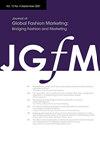南非服装销售专业人员的“必备”技能和知识
IF 5.5
Q2 BUSINESS
引用次数: 2
摘要
摘要雇佣合格的跟单员已成为服装公司面临的全球性挑战。本研究旨在优先考虑在营销职位上发挥作用所需的营销技能和知识。采用自适应联合分析对29种已识别的技能和知识类型以及描述这些类型的116个个体维度进行了优先排序。使用Sawtoth Software股份有限公司进行了一项在线调查。共有172名营销专业人员参与了这项研究。Sawtothe软件内置回归分析用于分析调查结果。确定了29种技能和知识类型的优先顺序,包括13种“必备”、13种“相当重要”和3种“值得拥有”类型。13种“必备”技能和知识类型包括六种软技能类型(沟通、外交、灵活性、行政/管理、积极态度、团队合作)、一种硬技能类型(技术)、五种显性知识类型(零售运营、制造、市场意识、分类管理、产品开发),以及一种隐性知识(专业经验)。根据优先考虑的29种技能和知识类型,为南非零售业调整了服装销售能力框架。在116个个体维度中,只有一半(58个)被确定为必要维度,并被纳入最终框架。研究结果表明,一个有能力的营销专业人员应该具备平衡的技能和知识,才能在服装零售业取得成功。本文章由计算机程序翻译,如有差异,请以英文原文为准。
“Must-have” skills and knowledge for apparel merchandising professionals in South Africa
ABSTRACT Employing competent merchandisers has become a global challenge for apparel companies. This study aimed to prioritize merchandising skills and knowledge required to function in merchandising positions. Adaptive conjoint analysis was employed to prioritize 29 identified skills and knowledge types and 116 individual dimensions describing these types. An online survey was developed and administered using Sawtooth Software Inc. A total of 172 merchandising professionals participated in the study. Sawtooth Software built-in regression analysis was used to analyze the survey responses. A priority order for the 29 skills and knowledge types was established, consisting of 13 “must-have”, 13 “fairly-important”, and three “nice-to-have” types. The 13 “must-have” skills and knowledge types included a mix of six soft skill types (communication, diplomacy, flexibility, administrative/managerial, positive attitude, teamwork), one hard skill type (technology), five explicit knowledge types (retail operations, manufacturing, marketplace awareness, assortment management, product development), and one tacit knowledge (professional experience). Based on the prioritized 29 skills and knowledge types, an apparel merchandising competency framework was adapted for the South African retail industry. Out of the 116 individual dimensions only half (58) were determined as essential and included in the final framework. The findings indicate that a competent merchandising professional should have a well-balanced skill and knowledge set to succeed in the apparel retail industry.
求助全文
通过发布文献求助,成功后即可免费获取论文全文。
去求助
来源期刊

Journal of Global Fashion Marketing
BUSINESS-
CiteScore
6.90
自引率
31.60%
发文量
34
期刊介绍:
The Journal of Global Fashion Marketing is a quarterly journal that publishes peer-reviewed conceptual and empirical papers and business cases of original works that significantly contribute to the overall advancement of marketing theory, research, and practice in fashion, design, and culture. JGFM endeavors to be a “global bridge” connecting marketing scholars and practitioners in fashion, design, and culture throughout the world. We publish high-quality scholarly articles on marketing written by contributors representing the leading academic authors. As we state on the cover of every issue, our positioning statement, our value added to the marketing scholar readership, is truly to “Bridge Fashion and Marketing” 1. Monitor and analyze global fashion marketing trends. 2. Generate and integrate new ideas and theories related to fashion, luxury, and culture marketing theory and practice. 3. Apply new research methods and techniques in fashion, luxury, and culture marketing. 4. Explore and disseminate cutting edge fashion marketing practices. JGFM welcomes manuscripts that provide fresh, innovative insight to any topic in the field of fashion, luxury, and culture marketing. Both conceptual and empirical works are valued, so long as the manuscript addresses substantive issues in marketing.
 求助内容:
求助内容: 应助结果提醒方式:
应助结果提醒方式:


